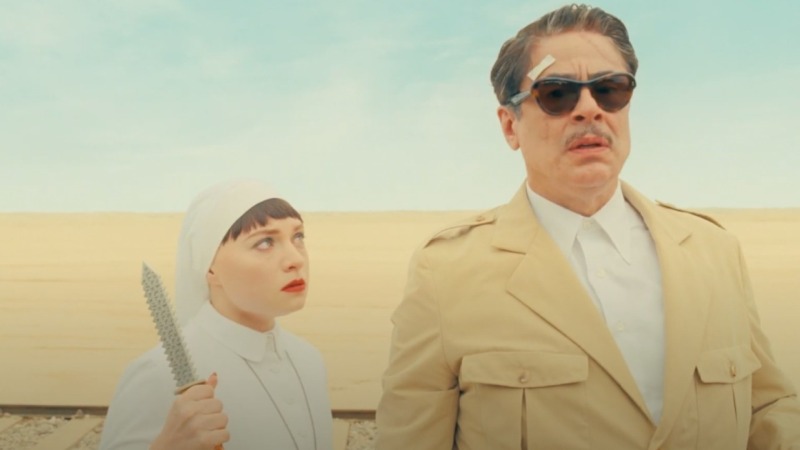The Phoenician Scheme Is Another Sublime Wes Anderson Fantasy

There’s a scene early on in the The Phoenician Scheme, Wes Anderson’s latest burst of whimsy, where I became enamored with how the typeface was laid out. Now, one shouldn’t normally fixate on such elements, but in rare cases (Dr. Strangelove’s Pablo Ferro scribbles comes to mind, or perhaps the mid-film credit sequence in Gaspar Noé’s Climax, or, heck, the sublime logo curvature and oblique crawl that opens the Star Wars films) it’s worth taking a moment to celebrate.
Now, the font face isn’t some revelation, following the type of sans-serif looks that go back to his earliest films, from the Futura of his first works through to differing choices as he’s continued to evolve and ornamentalize. In The Phoenician Scheme, it’s a scene shot from above, as if Dogville by Lars Von Trier was shot in a papal palace instead of a chalk-outlined blank studio space, where we see a recovering Zsa-zsa Korda (Benicio del Toro), recovering in a bath as his servants deliver delicious looking scrambled eggs and care for his every need. It’s a gorgeous tableau (unsurprisingly, almost every frame in this film could be hung in a gallery like the masterpiece paintings that diagetically litter the spaces we see on screen), but it was the tiled floor and how it fit with the font that most amused, mere minutes in.
Now, fixating on this detail may seem somewhat silly, but I have to again articulate how perfect it all fits. The tiles on the (vast) bathroom floor are geometric diamonds highlighting black, grey, and white, and the type face listing the retinue of characters and primary crew members lays atop, perfectly, elegantly integrated. Black text, thin white outline, thicker grey outline atop again, as if the floors tiles themselves are shifting as each name enters the screen. There’s a warm feeling where even something as seemingly trivial as shifting credit text is somehow made sublime, a part of the space as carefully thought out as any of the myriad of other elements. It all fits together in visual ways that truly are cinematically cathartic.
And so, fans are treated to another of Wes Anderson’s wondrous adventures, this one surely among his most playful despite its often morbid situations. The story is amusingly convoluted, the tasks of the protagonists literally houses in shoe-box side compartments, each leading on a unique and yet connected adventure.
Korda is a rich business person looking to create a massive industrial and commercial development in a sand-filled region, but he needs an heir. Despite being seemingly immortal (even multiple plane incidents can’t deliver him to heaven’s embrace), he chooses his alleged daughter Liesl (Mia Threapleton), a nun with a sour face and disposition to match, embittered by her alleged father’s heretofore absentee parenting schema.
Looking on as the father and daughter connect is a hapless tutor named Bjørn Lund (Michael Cera), his thick Scandinavian accent redolent of the chef on The Muppet Show. Other members of ensemble include many Andersonian regulars, from Jeffery Wright, Bryan Cranston, Matheiu Amalric, Jeffrey Wright and Tom Hanks as fellow oligarchs, Scarlett Johansson as a cousin/potential spouse, Benedict Cumberbatch as an Uncle. Rupert Friend, Hope Davis, Charlotte Gainsbourg, F. Murray Abraham, Richard Ayoade, Riz Ahmed and many others round out the cast, including, naturally, Bill Murray making an appearance as God.
-

-

-

-

-

-

-

-

-

-

-

-

-

-

-

-

-

-

-

-

-

-

-

-

-

-

-

-

-

-

-

-

-

-

-

-

-

-

-

-








































